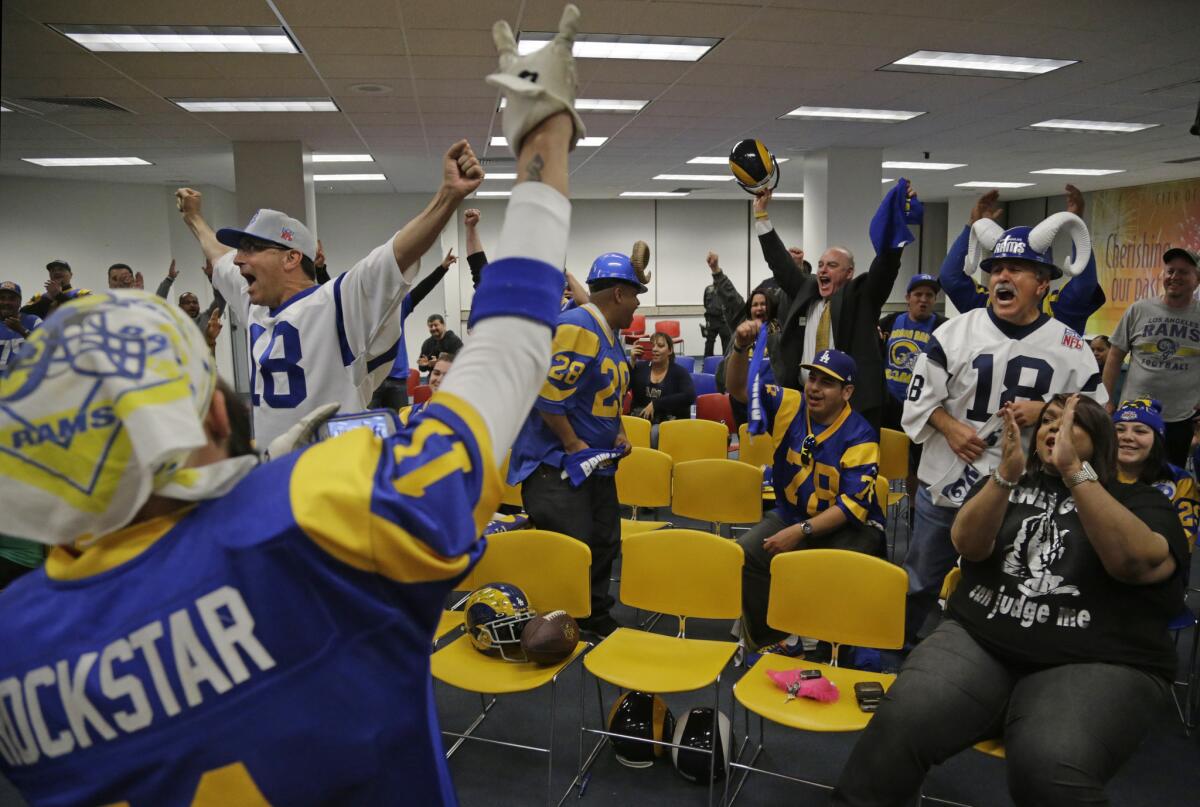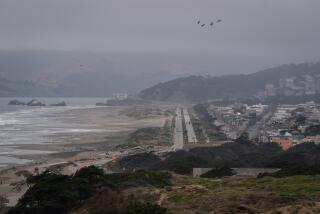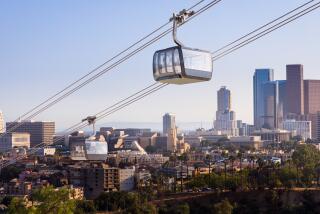California bill aims to make it harder for megaprojects to sidestep state environmental law

Two years ago, the Los Angeles Rams did something unheard of in California development politics: In just six weeks, the team went from unveiling plans for an 80,000-seat stadium to earning final approval from the Inglewood City Council.
The fast decision came with another bonus: Inglewood’s vote allowed the stadium to sidestep legal challenges under the state’s primary environmental law that governs development, lawsuits that could have caused years of delay in the courtroom.
“Now we can celebrate,” Inglewood Mayor James T. Butts Jr. said immediately after the vote as the crowd rose in jubilation.
But the Rams’ path to a now-under-construction stadium is under attack from a state lawmaker who argues that the team benefitted from a legal loophole only available to the wealthy and powerful.
Assemblyman Jose Medina (D-Riverside) says the Rams — and at least five other large developers whose projects were approved by similar means in recent years — have been able to spend significant sums of money to ignore state environmental laws. He’s authored new legislation to block future developers from doing what the Rams did, by prohibiting local governments from approving projects without an exhaustive environmental review.
“You shouldn’t have such undue ability that money buys access,” Medina said.
The process the Rams used to secure approval for their stadium shows how the state’s election laws can trump environmental rules.
When the Rams released their stadium plans, they announced that they were mounting a ballot measure campaign to collect signatures from Inglewood voters. Developments approved by voter initiatives are allowed to skip the California Environmental Quality Act review process, which otherwise requires disclosure of any effects a project might have on the environment, an evaluation of alternatives and, in many cases, proposed changes that would reduce those environmental effects.
Environmentalists have praised CEQA as an indispensable tool in protecting the state’s natural beauty since it became law in 1970. But the measure often is criticized as burdensome to development, and has been used to block or delay bike lanes and other environmentally friendly projects. Lawsuits filed under CEQA can sometimes take years to resolve.
Once the Rams’ stadium initiative collected enough signatures to force a public vote on the project, the Inglewood City Council decided to skip the voters and approve the stadium itself. The California Supreme Court signed off on the legality of this method in 2014, after Walmart used it to fast-track a store in Tuolumne County.
Since the Walmart decision, at least four other large developments have sought approval for their projects in a similar way: the Rams stadium, a failed professional football stadium project for the Chargers and Raiders in Carson, a shopping and entertainment center in northern San Diego County and a massive warehouse complex in Riverside County. Developers of a proposed professional soccer stadium in San Diego are just beginning to collect voter signatures for their project in hopes of pressuring the city’s council members.
Assembly Bill 890 requires developers to undergo full CEQA review — opening their projects up to environmental lawsuits — and bans local governments from approving such projects outright, while forcing developers to pay the cost of any special election.
Medina said he was inspired to act by Moreno Valley’s approval in 2015 of the 41-million-square-foot World Logistics Center warehouse complex, one of the nation’s largest. Only wealthy developers can finance the initiative drives needed to get their projects approved, Medina said, and they can also spend big on the campaigns of local elected officials. World Logistics Center’s developer, Highland Fairview, spent more than $800,000 on the project’s initiative campaign.
“Big developers, including in Moreno Valley, have a lot of influence in the city council,” Medina said. “The state, and me as a representative, can add additional safeguards.”
But Iddo Benzeevi, Highland Fairview’s president and CEO, said his company jumped through numerous hurdles to get the project off the ground, including completing a full environmental review. Moreno Valley’s City Council approved World Logistics Center multiple times. A referendum drive to overturn that approval later failed, and the approving City Council members were later reelected.
The public and elected officials should continue to have the right to greenlight projects this way, he said.
“What the initiative process provides is for the people to voice their interest,” Benzeevi said. “The people get to decide.”
The method hasn’t proved foolproof.
Last year, Los Angeles developer Rick Caruso failed in his bid to build a shopping and entertainment complex in Carlsbad similar to the Grove outdoor mall in Los Angeles. The Carlsbad City Council approved the project after a Caruso-backed ballot initiative brought the matter before them, but residents then overturned that approval through a referendum. Caruso spent nearly $12 million in a losing effort.
Still, developers remain interested in using the process, especially for projects they argue need fast approval. Backers of San Diego’s proposed professional soccer stadium are planning to ask the City Council to approve that project following an initiative signature drive. The group, FS Investors, has applied to Major League Soccer for an expansion franchise, and if the stadium isn’t fully approved later this year, a spokesman for the project said, the city won’t get a team.
“Stadium certainty is one of the key factors the MLS Board will use in awarding the last four franchises later this year, so absent this process, it would basically take San Diego out of the running for a franchise,” project spokesman Craig Benedetto said.
ALSO
Inglewood council approves NFL stadium plan amid big community support
Moreno Valley leaders OK initiatives in favor of 40-million-square-foot warehouse project
Want a bike lane in your neighborhood? It’s not so simple in California
Updates on California politics
More to Read
Get the L.A. Times Politics newsletter
Deeply reported insights into legislation, politics and policy from Sacramento, Washington and beyond. In your inbox three times per week.
You may occasionally receive promotional content from the Los Angeles Times.







